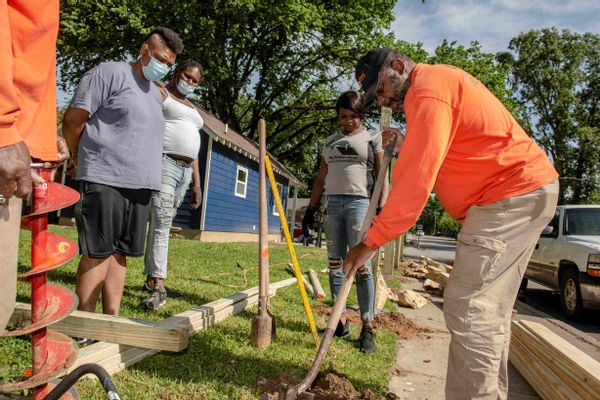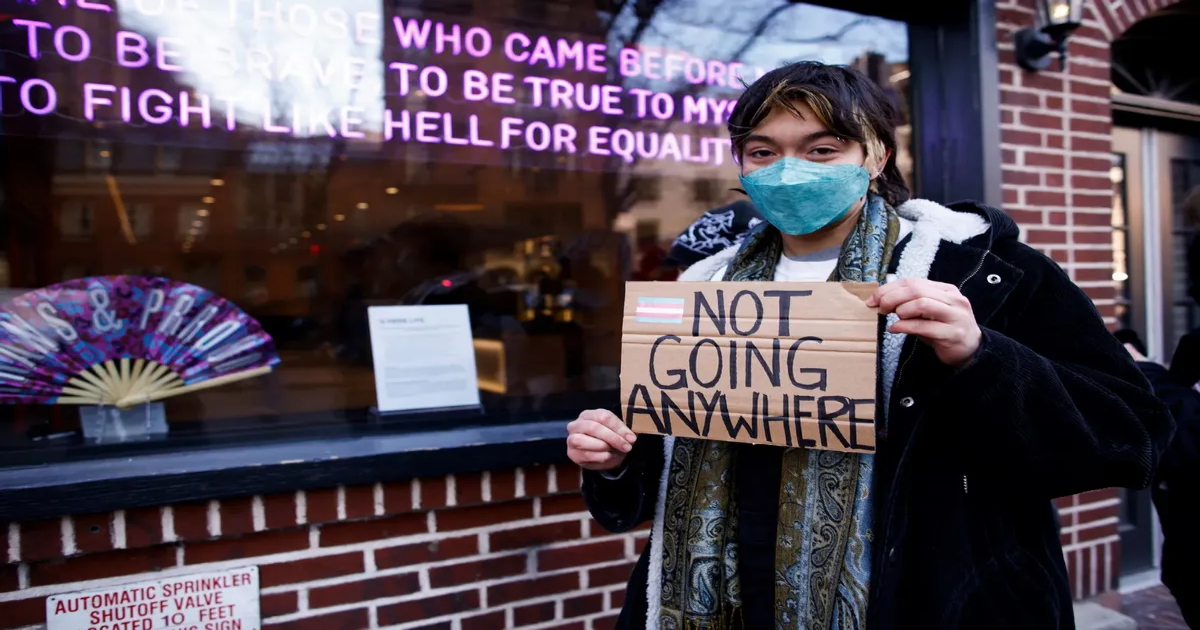In recent weeks, My Sistah’s House finished its 11th tiny home, the latest iteration of its Tiny House Project, which seeks to provide transgender and gender non-conforming citizens with transitional housing in a safe, inclusive community in South Memphis, Tennessee.
The LGBTQ+ housing organization has built 10 other homes since it established the project in 2022 and is working on erecting more while developing the community green space at the corner of the neighborhood. The goal, according to Founding Director Kayla Gore, is to chip away at the high rates of housing instability for transgender and gender expansive Memphians, who, like trans Americans across the country, more frequently face homelessness and housing insecurity due to employment discrimination.
“A lot of trans people are seen as the problem, so they’re either not hired or they’re fired very quickly,” Gore told Salon in a phone interview. “Our program, it helps people in the sense that, one, the housing is affordable, it’s safe, it’s adequate, it’s in a nice community. But it also shows other organizations that this is a community that really needs to be prioritized within your programming.”
Since President Donald Trump took office and signed an executive order limiting sex to male and female at the federal level, My Sistah’s House has had to funnel more of its limited resources into national organizing, a change Gore said she’d prefer not to have to make. But, she said, the top-down attacks have inspired the organization to temporarily take their project in a new direction: building an emergency shelter. It’s just one example of how the 2024 election has prompted activists to reassess their work and the needs of their communities.
Amid the onslaught of anti-transgender legislation threatening their rights, freedoms and access to basic services in state legislatures and with the Trump administration’s laser-focus on the demographic fanning the flames, trans activists are finding different ways to support their community and address disparities. In the process, they’re shifting focus from just staving off the infringement of their rights and freedoms from outside actors to cultivating joy and belonging within their communities.
“A lot of people are in fear, so it would be really important for us to come together and show a unified support system that’s here in Memphis, that people don’t have to leave the city or the state to flee to a sanctuary city or state, that there is a sanctuary within the state of Tennessee,” Gore said, adding that she’s hoping to provide a glimpse of that during a rally for International Transgender Day of Visibility on Monday.
While anti-trans legislation in Tennessee, like the state’s recently passed bathroom bill, has been an issue for years, the Trump administration’s moves to eliminate what the president terms “gender ideology” from the federal government threatens to upend Gore’s efforts. The Department of Housing and Urban Development earlier this year announced it would no longer enforce the Equal Access Rule, which barred discrimination based on gender identity, sexual orientation and marital status in HUD-funded housing, facilities and services. Gore said that she and other housing rights activists anticipate the administration will move to eliminate the rule altogether.
But the threat has only made her more determined to continue her work. Though My Sistah’s House initially had plans to build a triplex — each unit with two bedrooms and a backyard porch — Gore said the organization, instead, has decided to build a shelter and drop-in space in anticipation of greater need for housing and resources for trans Memphians during the Trump presidency.
Current plans for the building include a top-floor emergency shelter with four, single-occupancy living quarters and a commercial ground floor replete with a communal space for hosting programming, internet access, shower and bathroom facilities, and mailboxes. If all goes according to plan, Gore said she hopes the space will be near completion in December.
“It’s really so many different layers to how impactful this work is, not just to the folks who are in the houses but to the people who live in the community,” she said. “They’re seeing streets that once had no houses on it or rotting lots or dilapidated houses that we’ve come in, purchased the land, tore down the houses, and we’re rebuilding the community.”
In Texas, where state lawmakers are considering bills to establish biological definitions of sex in state code and charge people with a felony for identifying with a gender not aligned with their birth-assigned sex, activists with the Normal Anomaly Inititative have launched new health and advocacy programs dedicated to empowering community members to fight for themselves and safely navigate the current political climate.
It’s PrEPHer program, named after the preventative medication protecting against HIV transmission, seeks to provide Black and brown women with education on sexual health, encourage PrEP usage and connect them with resources.

Joelle Espeut, the Normaly Anomaly Initiative’s advocacy program director, said that the program’s inclusion of Black and brown women across “the spectrum of womanhood” builds an intentionally inclusive space that similar sexual health programs don’t typically do.
“It’s [for] cisgender women, heterosexual women, queer women, trans women,” Espeut said in a phone interview. “We wanted to create space for women to engage with their sexual health and wellness, and that is unique in the sense that we usually don’t see that, especially for Black and brown women.”
Meanwhile, the group’s Drag University cohort — part of its Luminate initiative aimed at teaching members of queer subcommunities how to advocate — connects drag entertainers across the gender spectrum with leadership skills and resources. It also enriches their drag performance through lessons on makeup application, garment tailoring and stage presence. The program culminates in a an outreach activity, a digital media project and a pageant during the organization’s annual Black Queer Advancement Festival, slated for the final week of April.
The Trump administration’s executive orders have inflamed the barrage of anti-trans legislation and opinions targeting the trans community, which have sparked “necessary” outcry, marches and protests. But, Espeut said that, going forward, the organization will commit further to creating more positive visibility of and “brave spaces” for Houston’s trans and broader Black and brown LGBTQ+ community that allow them to be their “full authentic selves.”
“Our work has always centered community. Our work has always centered creating brave spaces, but we’ve really leaned into, ‘What does visibility and joy mean?'” she told Salon.
“We think that that is one of the most important things because if the community can’t experience joy, and trans people can’t experience joy, then there really is no hope for the future,” Espeut added.
Activists with One Iowa in Des Moines, which works toward bolstering equality in education, workplace culture and healthcare access, have taken a similar approach in the wake of Trump’s presidency. Executive Director Max Mowitz told Salon that the state-wide organization has shifted its focus more to supporting individuals and marginalized rural communities in 2025, a reaction both to the fallout of Trump’s anti-DEI efforts and the increased attacks on trans rights within the state.
In February, Iowa’s Republican Gov. Kim Reynolds signed a bill into law that strikes “gender identity” from the list of protected groups in the state’s Civil Rights Act, making it the first in the nation to strip civil rights from a previously protected class. The law, which takes effect July 1, opens trans and gender expansive Iowans up to discrimination in housing, employment, education and public services.
“Visibility without safety is tokenization — it’s dangerous. I think that we are more at the apex of that than we maybe have ever been in American history,” Mowitz said. “It feels a little bit more dangerous and unsafe than before because all of our protections are being rolled back, and we’re being villainized in these ways.”
To combat that, One Iowa has started to recenter its workplace education on equipping individual workers with tools to take care of themselves and protect themselves from discrimination rather than only offering diversity trainings to corporations. One such effort, Mowitz said, is to increase the amount of educational resources the organization provides to rural healthcare providers.
The group has also started to embed itself in smaller communities, traveling to rural parts of Iowa to host office hours, connecting with LGBTQ+ residents and better supporting their Pride events. While still in its early stages, those communities have so far been receptive to One Iowa’s increased presence.
“We know that the Iowa State Legislature and the Trump administration, they want us to feel isolated. They want us to feel, like, very, very disconnected from each other,” Mowitz said. Residents have recognized that “there are people that are fighting for us. There are people that want to connect, and there are people that care about us outside of our small town.”
Mowitz said that he’s taken away a similar lesson from the current moment: Iowans, including cisgender allies, are strong in numbers and unrelenting in their fight against the attack on trans Americans’ rights. That’s also the message he said he wants the trans community to internalize on Trans Day of Visibility.
“For all of the stuff that I see that is really bad, up close and personal — legislation, vitriol, hostility — I see just as many people that are trying to step up and do something to support our community,” Mowitz said, adding: “Even if you don’t see them, folks are fighting for you in every single corner of our community.”
